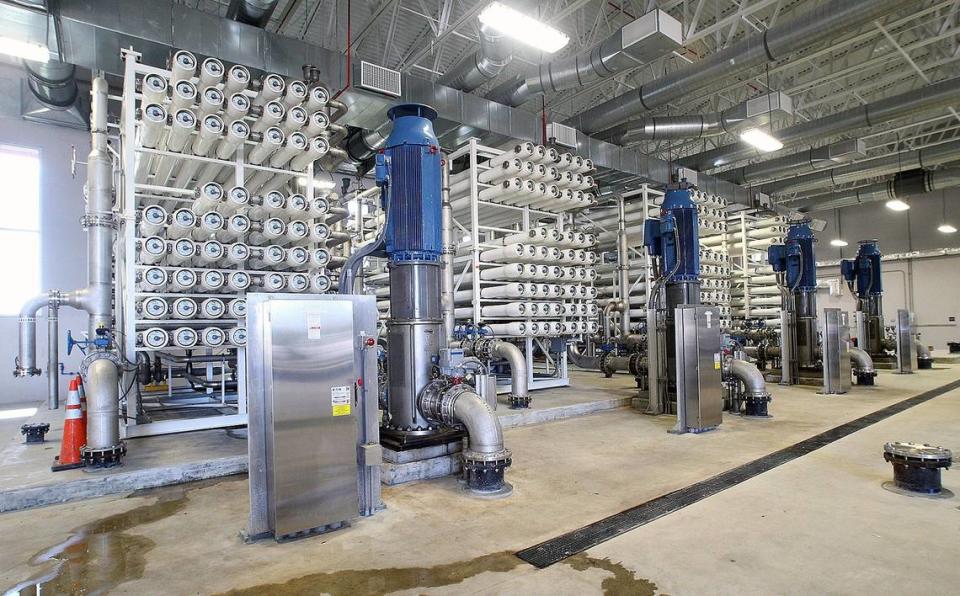This week, Hialeah’s council unanimously approved the suspension of a franchise fee on water and sewer bills. But rather than expressing recognition, some residents were dismissive of the proposal, instead urging the city to hire more customer service personnel — one of many longstanding complaints about the Public Works Department, which manages Hialeah’s water and sewer system.
Milly Herrera, a longtime resident and former council candidate, challenged the council members at a meeting Tuesday, saying, “How much is this going to save me or the average person? $5? Let me make it easy for you — vote no.”
Herrera, who often advocates against over-development in the city, suggested that rather than offering minimal bill reductions, the city should “take the money and hire someone for customer service to answer the phone.”
The city imposes a franchise fee on utilities for using municipal rights-of-way. The fee is calculated as a percentage of a property owner’s bimonthly usage. It was initially set at 10% when introduced in 2014 under Mayor Carlos Hernández, but since 2019 the fee has gradually decreased to its current rate of 4%. The fee contributes to making Hialeah’s utility services among the most expensive in Miami-Dade County.
Despite Hialeah’s promises to offset the county’s impending rate hike, which imposes a 13.6% increase in water rates and a 3.3% decrease in sewer rates for Hialeah — resulting in an overall 10% rise in costs for residents next fiscal year — residents may still see an increase in their bills. The fee suspension, which would take the overall increase down to 6%, would benefit customers with an average or below-average bimonthly consumption of 5,250 gallons.
The ordinance passed an initial vote on Aug. 15 without further debate. During the final vote, Councilman Bryan Calvo, who was absent from the first, reopened the discussion, advocating for the elimination of the fee — not just a suspension. He noted that three years ago, budgetary constraints made it impossible, but now the budget has swelled by nearly $50 million.
“We’re in a financial position to eliminate this franchise fee, and we should because it’s just an additional tax on residents,” Calvo said. “But the larger conversation remains: What is the future of Hialeah’s water?”
In the first debate, Frank De La Paz, a longtime lobbyist for small developers in the city, raised concerns about challenges in obtaining the sewer capacity certification letter required by the county for property development. He highlighted the difficulties in meeting with department employees to address those matters.
Mayor Esteban “Steve” Bovo said that his administration considered eliminating the fee, which represented around $3.8 million in the budget but said the city’s financials aren’t “there yet.”
However, he pointed out that when the city introduced a water bill relief program last year, “virtually nobody” applied. Despite allocating a budget of up to $250,000 for the initiative, only $4,711 was distributed in grants. According to public records from the Finance Department provided to el Nuevo Herald, just 117 families qualified for the program. On average, each recipient received a one-time credit of $40 on their service bill.
Bovo used Calvo’s remarks as an opportunity to address the ongoing “discrepancy” with Miami-Dade County, which is seeking $18 million in unpaid past services. Hialeah residents receive their sewer services from the county and half of their water from Miami-Dade. The other half comes from a reverse osmosis plant co-owned by the city and the county.
Miami-Dade County issued an ultimatum to Hialeah in a letter dated July 22, demanding $18 million by Aug. 31. Hialeah requested an extension until Sept. 30, which the county granted.
“I think it would be irresponsible for the city to cut a check for $18 million just because they said so. I don’t agree with that,” Bovo said. “But we still have to pay for the water plant, which produces more expensive water than what we get from the county. There’s no current path for the county to take the plant and absolve us of the debt, but we’re in constant talks to resolve this.”

The treatment plant’s construction cost $100 million, with Miami-Dade County financing 50% and the remaining half funded through city-issued bonds. While the project was designed to produce 10 million gallons of water per day, its current capacity stands at 7.5 million gallons per day.
EMEA Tribune is not involved in this news article, it is taken from our partners and or from the News Agencies. Copyright and Credit go to the News Agencies, email news@emeatribune.com Follow our WhatsApp verified Channel





